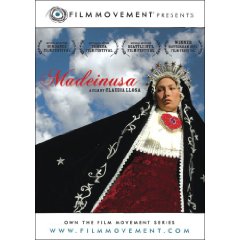
 Tiempo Santo, or Holy Time, is when god comes down off his pedestal and cannot see the sins of man. On Good Friday, after acknowledging the crucifixion of Christ, the townspeople begin a festival of decadence where, since Jesus is gone, all sins cannot be seen until he rises again on Easter Sunday. The small, anonymous Andean village is quite isolated from the rest of the country and therefore no one knows what goes on and all traffic in and out is cut off. There are orgies, robberies, murders, and rapes as there are no rules and god’s eye is nowhere to be seen. Madeinusa (2005), centers on this fictional festival.
Tiempo Santo, or Holy Time, is when god comes down off his pedestal and cannot see the sins of man. On Good Friday, after acknowledging the crucifixion of Christ, the townspeople begin a festival of decadence where, since Jesus is gone, all sins cannot be seen until he rises again on Easter Sunday. The small, anonymous Andean village is quite isolated from the rest of the country and therefore no one knows what goes on and all traffic in and out is cut off. There are orgies, robberies, murders, and rapes as there are no rules and god’s eye is nowhere to be seen. Madeinusa (2005), centers on this fictional festival.
The film is one of the first made in Peru to use both Quechua and Spanish languages. Director Claudia Llosa’s tale centers on two people. First is Salvador played by Carlos de la Torre, a man from Lima, a grungy backpacker type with mediocre acting skills gets caught in the town as no transportation goes in and out and has no way to leave while the festival ensues. The city officials don’t want him to see what goes on, so they lock him in the town jail, though an attractive young girl lets him out. No one seems to care as he wanders through the festivities and observes the oddities going on. The second is Madeinusa played by Magaly Solier. She is the daughter of the town mayor and considered a chosen girl. Madeinusa’s mother ran away and in the loss her father has become unusually attracted to her. As you would expect, the two characters fall in love but the circumstances of the bizarre festival make the story follow a strange turn.
Writer and photographer Nicholas Gill is the editor/publisher of New World Review. He lives in Lima, Peru and Brooklyn, New York. His work has appeared in publications such as the New York Times, Los Angeles Times, CondeNast Traveler, National Geographic Traveler, Afar, and Penthouse. Visit his personal website (nicholas-gill.com) for more information.













Leave a Comment